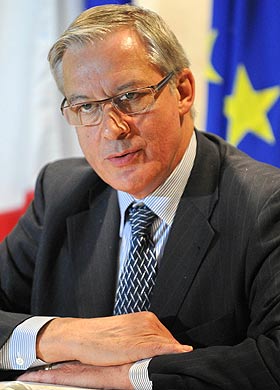Related Topics
Philadelphia Legal Scene
The American legal profession grew up in this town, creating institutions and traditions that set the style for everyone else. Boston, New York and Washington have lots of influential lawyers, but Philadelphia shapes the legal profession.
Philadelphia Economics
economics
Whither, Federal Reserve? (2)After Our Crash
Whither, Federal Reserve? (2)
U.S. and E.U. Exchange Experiences (1)
THE Global Interdependence Center (GIC), founded by Nobelist Lawrence Klein in 1976, brings noted foreign financiers to address Philadelphians interested in finance, and takes those Philadelphians abroad to return the visits. It's a gracious, entertaining, and highly stimulating travel club of very nice folks. Its 25th Annual Monetary and Trade Conference (in 2001) was especially exhilarating. Christian Noyer, President of the Banque de France, gave a description of the rationale and direction of the European common currency. Since he was the Euro's driving force right from the beginning, the experience of hearing him was pretty much like hearing Alexander Hamilton tell the story of the founding of the American banking system. Such a notable event needs to be reported.

|
| Christian Noyer |
Christian Noyer urged that the central concept of the European Union is deliberate, voluntary surrender of national sovereignty -- for a mutually beneficial purpose. The declared purpose of the limited surrender of national control of the currency is economic; price stability, lower interest rates, the stimulation of international trade by lowering transaction costs. But the unstated, grander, purpose is the elimination of war. Because the limited technical purpose has been achieved in almost all areas, the grander purpose of eliminating war has not been an accident. With this simple, even humble, declaration it immediately becomes possible for a mildly irritated American audience to understand that European reluctance to become our active military ally grows out of a highly commendable set of motives, and widely differing historical experiences.
<As things worked out, the new nations who have recently joined the Union ("The U") are anxious to modernize, because the people of those nations demand modernization and their leaders must agree to achieve it. Inflation, that hitherto inevitable fund-raiser for national governments, must be eliminated in order to join and stays eliminated because the other members of The U will not tolerate it in a partner. In his curious way, "price stability" has placed the Union on the side of the people against the locally powerful, although it would be untactful to emphasize it. From the elimination of inflation comes lower interest rates, and from that, a stable currency. From that comes economic growth, for which the political lingo seems to be "modernity". As a consequence of this undeniable success, all nations in the area want to join the Union, and none wants to leave it. If that prevailing attitude doesn't lead to the elimination of what might then be a civil war, it's hard to know what will eliminate it. The marvel of all this skillful analysis is how natural, soft and modest it sounded, feeling like an old soft shoe. Eventual political unification is clearly an old dream in Noyer's head, but for now, he seems content with the vindication that it is possible to have a currency without having a country control it. It seems to be a steamroller of economic logic, flattening out the pretenses of merely political power.
No less an economist than Martin Feldstein has written that stable unified currency is doomed in the European context of widely diverse labor markets; Noyer seems pleasantly serene in the face of this argument. He wouldn't say so, of course, but some in the audience got the idea that Noyer probably believes the power of this cooperative idea will eventually discipline the unions the way it disciplined the politicians. One certainly hopes so, for the sake of this smooth, likable French aristocrat.
Originally published: Tuesday, April 17, 2007; most-recently modified: Sunday, July 21, 2019